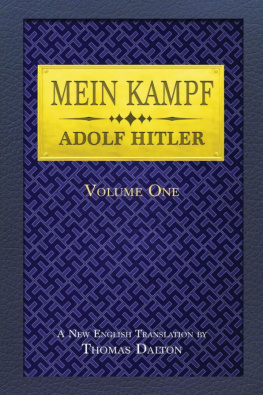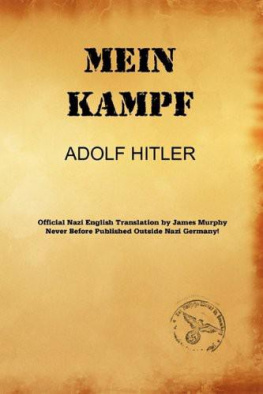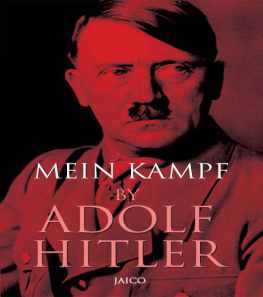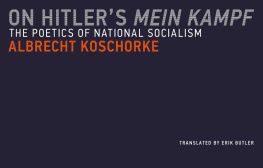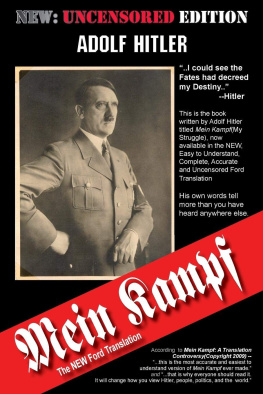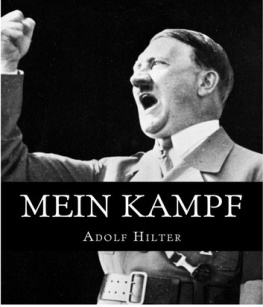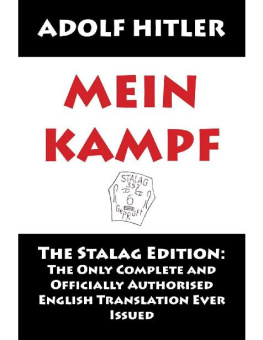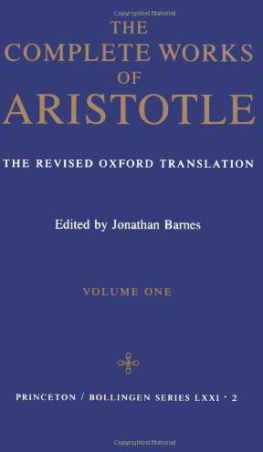MEIN KAMPF
ADOLF HITLER
TRANSLATED FROM THE GERMAN
BY
THOMAS DALTON
VOLUME ONE
CLEMENS & BLAIR, LLC
Introduction and English translation copyright 2018 by Thomas Dalton, PhD
All rights reserved. No part of this publication may be reproduced, stored in a retrieval system, or transmitted, in any form or by any means, electronic, mechanical, photocopying, recording, or otherwise.
Clemens & Blair, LLC, is a non-profit educational publisher.
This is an unofficial ebook recreated from a physical copy of the original book. Some minor formatting errors and misspellings may be present that did not exist in the original.
DEDICATION
At 12:30 pm, on 9 November 1923, the following men fell in front of the Feldherrnhalle and in the courtyard of the former War Ministry in Munich, with loyal faith in the resurrection of their people:
Alfarth, Felix; merchant; b. 5 July 1901
Bauriedl, Andreas; hatter; b. 4 May 1879
Casella, Theodor; bank clerk; b. 8 August 1900
Ehrlich, Wilhelm; bank clerk; b. 19 August 1894
Faust, Martin; bank clerk; b. 27 January 1901
Hechenberger, Anton; locksmith; b. 28 September 1902
Komer, Oskar; businessman; b. 4 January 1875
Kuhn, Karl; headwaiter; b. 26 July 1897
Laforce, Karl; engineering student; b. 28 October 1904
Neubauer, Kurt; valet; b. 27 March 1899
Pape, Claus von; businessman; b. 16 August 1904
Pfordten, Theodor von der; court councilor; b. 14 May 1873
Rickmers, Johann; retired captain; b. 7 May 1881
Scheubner-Richter, Max Erwin von; doctor of engineering; b. 9 January 1884
Stransky, Lorenz von; engineer; b. 14 March 1889
Wolf, Wilhelm; businessman; b. 19 October 1898
The so-called national authorities refused these dead heroes a common grave.
Therefore, for the common memory, I dedicate to them the first volume of this work. As martyrs to the cause, may they shine forever, as a permanent inspiration to the followers of our movement.
Adolf Hitler
Landsberg am Lech
16 October 1924
MEIN KAMPF:
AN INTRODUCTION
THOMAS DALTON
Mein Kampf is the autobiography and articulated worldview of one of the most consequential and visionary leaders in world history. It is also one of the most maligned and least understood texts of the 20th century. There have been so many obfuscations, deceptions, and outright falsehoods circulated about this work, that one scarcely knows where to begin. Nonetheless, the time has come to set the story straight.
That Adolf Hitler would even have undertaken such a work is most fortunate. Being neither a formal academic nor a natural writer, and being fully preoccupied with pragmatic matters of party-building, he may never have begun such a major taskwere it not for the luxury of year-long jail term. In one of the many ironies of Hitler's life, it took just such an adverse event to prompt him to dictate his party's early history and his own life story. This would become volume one of his two-part, 700-page magnum opus. It would have a dramatic effect on world history, and initiate a chain of events that has yet to fully play out. In this sense, Mein Kampf is as relevant today as when it was first written.
Perhaps the place to begin is with the rationale for the book. Why did Hitler write it at all? Clearly it was not a requirement; many major politicians in history have come and gone without leaving a personal written record. Even his time in prison could have been spent communicating with party leaders, building support, soliciting allies, and so on. But he chose to spend much of his stay documenting the origins and growth of his new movement. And for this we can be grateful.
The work at hand seems to have served at least four purposes for its author. First, it is autobiographical. This aspect consumes most of the first two chapters, and is repeatedly woven into the remainder of volume one. For those curious about the first 35 years of Hitler's life, this aspect is invaluable. It gives an accurate and relevant account of his upbringing, his education, and the early development of his worldview. Like any autobiography, it provides an irreplaceable first-hand description of a life. But as well, it offers the usual temptation to cast events in a flattering light, to downplay shortcomings, or to bypass inconvenient episodes. On this count, Hitler fares well; he provides an honest and open life story, devoid of known fabrications, obvious errors, or significant omissions. This book is essential for understanding his thinking and attitude on social, economic, and political matters that are of central concern.
Second, Mein Kampf is a kind of history lesson of Europe around the turn of the 20th century. Hitler was a proximate observerand often firsthand witnessto many of the major events of the time. He served in the trenches of World War One for more than four years, which was virtually the entire duration of the war. Serving on the 'losing' side, he naturally gives a different interpretation of events than is commonly portrayed by historians of the victorious nations. But this fact should be welcomed by any impartial observer, and in itself makes the book worth reading. With rare exceptionsuch as Jnger's Storm of Steelno other contemporary non-fiction German source of this time is readily available in English. For those interested in the Great War and its immediate aftermath, this book is irreplaceable.
In its third aspect, the book serves to document the origins and basic features of Hitler's worldview. This, unsurprisingly, is the most distorted part of the book, in standard Western accounts. Here we find the insights and trigger events that led a young man without formal higher education, to develop a strikingly visionary, expansive, and forward-looking ideology. Hitler's primary concern, as we read, was the future and well-being of the German peopleall Germans, regardless of the political unit in which they lived. The German people, or Volk, were, he believed, a single ethnicity with unique and singular self-interests. They wereindisputablyresponsible for many of the greatest achievements in Western history. They were among the leading lights in music, literature, architecture, science, and technology. They were great warriors, and great nation-builders. They were, in large part, the driving force behind Western civilization itself. All this is true and undeniable, and Hitler is justly proud of his heritage. Equally is he outraged at the indignities suffered by this great people in then-recent decadesculminating in the disastrous humiliation of WWI and the Treaty of Versailles. He seeks, above all, to remedy these injustices and restore greatness to the German people. To do this, he needs to identify both their primary opponents and the defective political ideologies and structures that bind them. Then he undertakes to outline a new socio-political system that can carry them forward to a higher and rightful destiny. He accomplishes all this, and more.
Finally, in its fourth aspect, Mein Kampf is a kind of blueprint for action. It describes the evolution and aims of National Socialism and the NSDAP, or Nazi Party, in compelling detail. Hitler naturally wants his new movement to succeed in assuming power in Germany and in a future German Reich. But this is no theoretical analysis. Hitler is nothing if not pragmatic. He has concrete goals and precise means of achieving them. He has nothing but disdain for the geistigen Waffen, the intellectual weapons, of the impotent intelligentsia. He demands results, and success. By all accounts, he achieved both.

